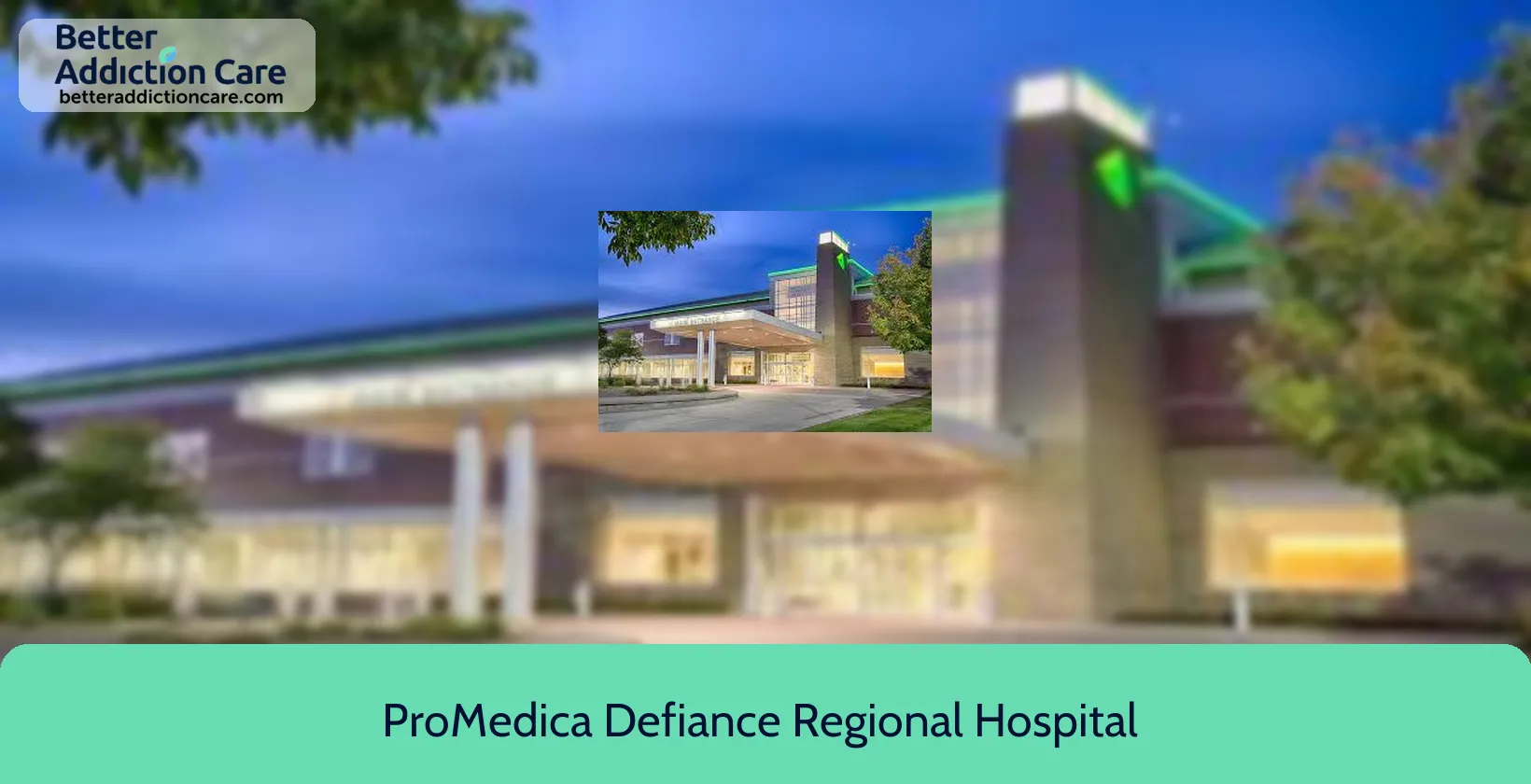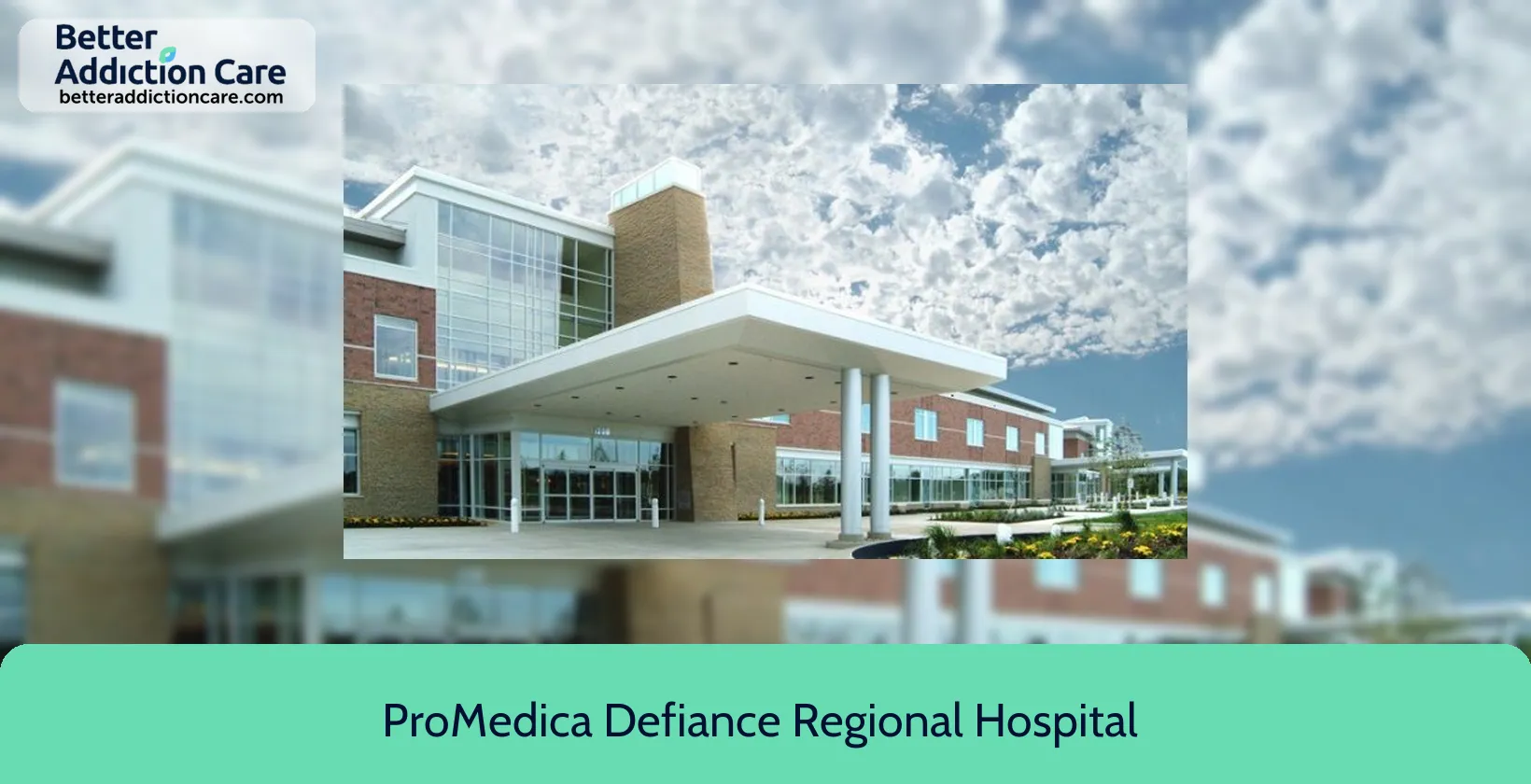ProMedica Defiance Regional Hospital - Coping Center
Overview
ProMedica Defiance Regional Hospital Coping Center, in Defiance, Ohio, provides comprehensive psychiatric care to adult patients. The center's mission is to assist individuals in managing life stressors in a secure and compassionate atmosphere, while also offering individualized care to each patient's specific needs.
The facility provides an inpatient program, medication management, and psychiatric care. Treatment options include Cognitive Behavioral Therapy (CBT), Activity Therapy, Anger Management, and Assertive Community Treatment. What distinguishes the Coping Center is its multidisciplinary treatment team, which comprises psychiatrists, psychologists, nurses, social workers, and activity therapists who collaborate to provide patient-centered therapy.
The Joint Commission has recognized ProMedica Defiance Regional Hospital, demonstrating its commitment to providing high-quality care and upholding safety requirements.
ProMedica Defiance Regional Hospital - Coping Center at a Glance
Payment Options
- Cash or self-payment
- Medicaid
- Medicare
- State-financed health insurance plan other than Medicaid
- Private health insurance
Assessments
- Screening for tobacco use
- Comprehensive mental health assessment
- Comprehensive substance use assessment
Age Groups
- Young adults
- Adults
- Seniors
Ancillary Services
- Chronic disease/illness management
- Court-ordered outpatient treatment
- Diet and exercise counseling
- Education services
- Family psychoeducation
Highlights About ProMedica Defiance Regional Hospital - Coping Center
6.65/10
With an overall rating of 6.65/10, this facility has following balanced range of services. Alcohol Rehabilitation: 8.00/10, Drug Rehab and Detox: 6.00/10, Insurance and Payments: 6.00/10, Treatment Options: 6.61/10.-
Alcohol Rehabilitation 8.00
-
Treatment Options 6.61
-
Drug Rehab and Detox 6.00
-
Insurance and Payments 6.00
Accreditations
The Joint Commission:

The Joint Commission accreditation for addiction and behavioral health is a prestigious recognition signifying a facility's commitment to delivering high-quality care and safety for individuals dealing with substance abuse and mental health issues. It involves rigorous evaluations and assessments, ensuring patients receive evidence-based treatment and exceptional care. This accreditation demonstrates a facility's dedication to continuous improvement and ethical practices, building trust among patients and healthcare professionals seeking top-tier addiction and behavioral health services.
Treatment At ProMedica Defiance Regional Hospital - Coping Center
Treatment Conditions
- Mental health treatment
- Substance use treatment
- Co-occurring Disorders
Care Levels
- Hospital inpatient/24-hour hospital inpatient
- Outpatient
Treatment Modalities
- Couples/family therapy
- Group counseling
- Cognitive behavioral therapy
- Integrated Mental and Substance Use Disorder treatment
- Activity therapy
Ancillary Services
Languages
- Sign language services for the deaf and hard of hearing
- English
Additional Services
- Pharmacotherapies administered during treatment
- Housing services
- Metabolic syndrome monitoring
Special Programs
- Persons 18 and older with serious mental illness (SMI)
Get Help Now
Common Questions About ProMedica Defiance Regional Hospital - Coping Center
Contact Information
Other Facilities in Defiance

7.14

7.06

6.62
DISCLAIMER: The facility name, logo and brand are the property and registered trademarks of Harbor, and are being used for identification and informational purposes only. Use of these names, logos and brands shall not imply endorsement. BetterAddictionCare.com is not affiliated with or sponsored by Harbor.


